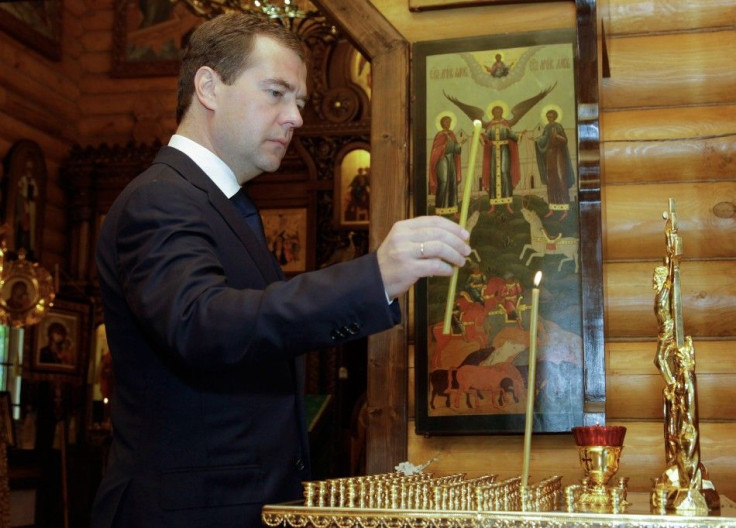Russian Boat Tragedy: Medvedev's Writs Sink Ships

The tragic sinking of a cruise boat on the Volga River has made the Russian Government all too aware of a growing safety problem in the country.
On Sunday, a river cruise ship called The Bulgaria carrying 208 vacationers overturned during its voyage. Only 79 of the passengers were rescued, and so far there are 50 confirmed deaths, but divers exploring the wreck project that there were at least 50 more trapped inside the vessel when it sank, including a high number of children.
It is the worst Russian maritime disaster since 1986, when a passenger ship and a freighter collided killing 423.
Incensed, President Dmitri Medvedev has promised to bring criminal actions against both the company operating the boat, as well as the two commercial vessels who passed by drowning passengers without stopping to help.
I have ordered to set up a state commission headed by the Transport Minister Igor Levitin for a probe into the Tatarstan [region] tragedy. It was obviously caused by safety violations, a poor condition of the vessel plus the weather. We should find out why the ship-owner let it sail. I also want a thorough inspection of all tourist ships, Medvedev said in a meeting on Monday.
Reports from Russia claim that the boat, which was built in 1955, was less than sea-worthy. It was likely a lack of regulation and safety inspections that caused the deaths of up to 100 people.
One of the boat's engines was underpowered before the 56 year-old vessel set sail, so when wind and choppy waters turned the boat sideways to waves -- a dangerous position for any boat to be in -- the captain was unable to right the ship before it tipped.
After the boat sank, which, according to witnesses it did in mere minutes, a tug boat and an oil ship passed by passengers of the Bulgaria in the water, but did not stop to save them. Later, a passenger ship called the Arabella saw the survivors and pulled nearly 80 out of the water.
According to preliminary information, at about the same time [the Bulgaria sank], two vessels passed. We know the ships and the captains' names. They are being questioned in the cities where they are presently located. We will use all legal measures in order to give [the captains] the maximum punishment, Russian Transport Minister Igor Levitin said on Monday.
But any criminal investigation, even one headed by top government officials, will do little to stop further disasters from happening.
Medvedev's probe, which is already underway, is a good display of concern, but to stop another tragedy, Medvedev must attack the problem at its source.
Negligence and antiquated vehicles are rampant in the Russia tourism industry, and are not exclusive to cruise lines. The airline industry still uses many Soviet-era jets and planes, and flights have sadly ended in tragedy on numerous occasions.
Since the collapse of the Soviet Union, when previously state-owned utilities and assets could be bought on the cheap, privately-owned Russian businesses have sacrificed safety for profit. And the relative lack of safety checks and regulations has made the practice all too easy.
According to Russia's Transportation Ministry, about six percent of operating vessels in Russia are as old or older than the Bulgaria, meaning that more than 100 of the registered 1500 passenger boats are older than 56 years. That figure does not account for unregistered boats.
Those are not individual shortcomings, but flaws of the 'Russian-style market', Ivan Melnikov, Russian Communist Party first deputy head told Russian International News Agency.
Additionally, the Bulgaria had not been inspected or retrofitted for years, according to an AP report, and the last major renovation might have happened as far back as 1980.
The Bulgaria, which was only supposed to hold about half the number of people on board during the voyage, apparently had an inadequate number of life vests and rafts.
The country's leaders have been keen to get tough on safety, whether it be fires in nightclubs, plane crashes or power plant disasters, said The Moscow News columnist Tim Wall.
It is Byzantine bureaucracy that is often the biggest culprit, leading to an absence of safety culture and a tendency to tick boxes rather than make real improvements.
© Copyright IBTimes 2024. All rights reserved.





















